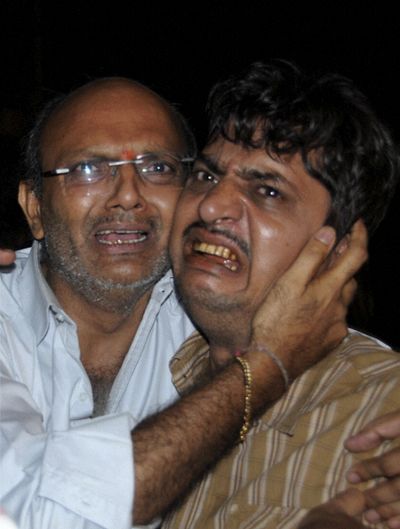India shaken again by attacks in Mumbai
Dozens killed, injured in explosions

NEW DELHI – For the second time in three years, Mumbai suffered a major terror attack Wednesday as three explosions rocked India’s financial capital, killing at least 17 people, wounding more than 100 and spreading fear and panic across the sprawling city.
The blasts, detonated over an 11-minute period beginning 6:54 p.m. just as commuters were heading home or out for dinner, apparently were timed for maximum damage and publicity.
But several analysts said that the explosions’ relatively low intensity, choice of targets and the fact that more people weren’t killed suggested this was the work of local militants and not a major Pakistan-linked group, such as the banned Lashkar-e-Taiba, or LET, that India blames for the 2008 attack on Mumbai that killed 166 people.
Instead of targeting international hotels and a Jewish center that resonated with global audiences as occurred three years ago, Wednesday’s blasts struck densely packed neighborhoods unfamiliar to those living outside of India.
One of the explosions took place in the crowded Dadar market area of central Mumbai, located near a major railway station, the second in the Jhaveri Bazaar jewelry district and the third – the largest, officials said – in the Opera House neighborhood, one of the world’s busiest diamond districts.
“This doesn’t bear the signature of the LET, which would have involved much greater intensity and impact,” said Rahul Bhonsle, a retired brigadier general and head of Security-risks.com, a military analysis group. “This appears more like local groups that are not so proficient.”
No one took immediate responsibility for the attack.
Mumbai was placed on high alert late Wednesday and residents were told to avoid crowded places.
Palaniappan Chidambaram, India’s home minister, said officials believed the blasts were “a coordinated attack by terrorists” even as he urged Mumbai residents and the nation to remain calm. Local officials said all schools would remain open today and mass transit would continue to operate normally, although security would be stepped up.
Indian authorities said all three blasts appeared to involve concealed explosives, amid suspicion the explosive device in Dadar was hidden in an electrical metering box above a bus stand and the one in Zaveri Bazaar was concealed beneath an umbrella.
Mumbai residents struggled to make sense of the tragedy.
“People who live in this city constantly face the threat of being blown up,” said Bhisham Mansukhani, a businessman who was held hostage in the Taj Mahal Palace hotel during the 2008 attack. “It’s intolerable.”